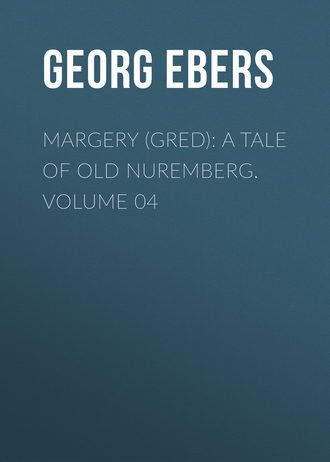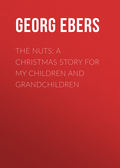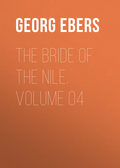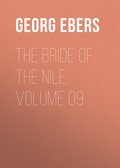
Georg Ebers
Margery (Gred): A Tale Of Old Nuremberg. Volume 04
For this he cared not one whit; nay, it increased his pleasure in making much of her and trying to spoil her shrewish foe's sport. It seemed as though he could never have enough of dancing with Ann, and so soon as the town pipers struck up, with cornets, trumpets, horns, and haut-boys, fiddles, sack-buts and rebecks, the rattle of drums and the groaning of bagpipes, while the Swiss fifes squeaked shrillv above the clatter of the kettle-drums, methought the music itself flung him in the air and brought him low again. With his free and mirthful ways he carried all before him, and when presently it was plain to all that he could outdo our nimblest dancers, and was a master of each kind of dance which was held in favor at every court, whether of Brandenburg, of Saxony, of Bohemia, or at our own Emperor Sigismund's Hungarian court, he was ere long entreated to show us some new figures of the dance; nor was he loth to do so.
Nay, he presently went to such lengths that our Franconian and Nuremberg nobles could but turn away their faces, inasmuch as he began so wild and unseemly a dance as was overmuch even for me, despite my youth and sheer delight in the quick measure.
My Hans, the young councillor, took pleasure in leading me forth in the Polish dance, or with due dignity in the Swabian figure, but he held back, as was fitting, from the mad whirl of the gipsy dance and of the "Dove dance;" and he, and I likewise, courteously withstood his bidding to join in the Dance of the Dead as it was in use in Brandenburg, Hungary, and Schleswig: one has to be for dead, and as he lieth another shall come to wake him with a kiss. On this Junker von Beust, who was, as the march—men say, the dance-corpse, entrapped Ann in a strange adventure. Ann kissed not his cheek, but in the air near by it, and the bold knave, who had no mind to forego so sweet a boon, declared to her after the dance was over that she was his debtor, and that he would give her no peace till she should pay him his due.
Ann courteously prayed him that he would be a merciful creditor and remit the payment of that she had indeed omitted, though truly out of no ill- will. And whereas he would by no means consent, the dispute was taken up by others present and Jorg Loffelholz devised the fancy of holding a Court of Love to decide the case.
This met with noisy approval, and albeit I and my dear Hans, and some others with us, made protest, the damsels were presently seated in a circle and Jorg Loffelholz, who was chosen to preside, asked of each to pronounce sentence. Thus it came to the turn of Ursula Tetzel and she, looking round on Junker Henning or ever she spoke, said, with a proud curl of her red lips, that she could give no opinion, inasmuch as she only knew what beseemed young maids of noble birth.
On this the Junker answered with such high and grave dignity as I should not have looked for in so scatter-brained a wight: "The best patent of nobility, fair lady, is that of the maid to whom God Almighty has vouchsafed the gentlest soul and sweetest grace; and in all this assembly I have found none more richly endowed with both than the damsel against whom I in jest have made complaint. Wherefor I pray the presiding judge of this Court of Love to ask you once more for your verdict."
Ursula found this ill to brook; nevertheless her high spirit was ready to meet it. She laughed loudly, and with seeming lightness, as she hastily answered him: "Then you haughty lords of the marches allow not that it is in the Emperor's power to grant letters of nobility, but ascribe it to Heaven alone! A bold opinion. Howbeit, I care not for politics, and will pronounce my sentence. If it had been Margery Schopper, who had refused the kiss, or Elsa Ebner, or any one of us whose ancestors bore arms by grace of the Emperor, and not of the God of the Brandenburgers, I would have condemned her to give you, in lieu of one kiss, two, in the presence of witnesses; but inasmuch as it is Mistress Ann Spiesz who has dared to withhold from a noble gentleman, a guest of the town, what we highborn damsels would readily have paid I grant her of our mercy, grace and leave to kiss the hand of Junker Henning von Beust, in token of penitence." The words were spoken clearly and steadfastly; all were silent, and I will confess that as Ursula gave her answer to the Junker with beaming eyes and quivering lips, never had I seen her more fair. It could plainly be seen by her heaving bosom how gladly she gave free vent to her old cherished grudge; and that she had in truth wounded the maid she hated to the very soul, Ann showed by her deathly paleness. Yet found she not a word in reply; and while Ursula was speaking, meseemed in the fullness of my wrath and grief as though a cloud were rising before my eyes. But so soon as she ceased and my eyes met the triumphant look in hers, my mind suddenly grew clear again, and never heeding the multitude that stood about us, I went a step forward, and cried: "We all thank you, Junker; you have taken the worthier part; the only part, Ursula," and I looked her sternly in the face, "the only part which I would have a friend of mine take, or any true heart."
The Junker bowed, and with a reproachful glance at Ursula he said: "Would to God I might never have a harder choice to make!" Whereupon he turned his back on her and went up to Ann; but Ursula again laughed loudly and called after him in defiance: "Oh! may heaven ever keep your wits clear when you have to choose, and especially when you have to discern on the high-road betwixt what is your own and what belongs to other folks."
The blood mounted to the Junker's face, and, as with a hasty gesture he smoothed back the fierce hair on his lip, methought he might seem the same as when he rose in his saddle to rush down on our merchants' wains; for indeed it was the Beusts, with the Alvenslebens, their near kinsfolks, who had fallen upon the train of waggons belonging to the Muffels and the Tetzels, near Juterbock, not a year ago.
But, hotly as his blood boiled, the Junker refrained himself, inasmuch as knightly courtesy forbade him to repay Ursula in the like coin; and as it fell Cousin Maud was enabled to aid him in this praiseworthy selfrule. She came forward with long strides, and her eyes flashed wrathful threats, till meseemed they were more fiery than the jewels in the tall plumes she wore on her head. She thrust aside the young men and maid who made up the Court of Love as a swift ship cuts through the small fry in the water. Without let or pause she pushed on, and as soon as she caught sight of Ann she seized her by the arm, stroked her hair and cheeks, and flung a few sharp words at Ursula:
"I will talk to you presently!" Then she bid me remain behind with Hans and withdrew, carrying Ann with her, while Junker Henning followed praying to be forgiven for all the discomfort she had suffered by reason of him. This Ann gladly granted, and besought us and him alike to come with her no further.
When he came back to us Ursula, who was aggrieved by the looks of displeasure she met on all sides, cried out: "Back already, Sir Junker? If you had so lightly yielded your rights to kiss of mine, you may be certain that I would have appealed to any one who would do my behest to call you to account for such scorn!"
She eyed the young nobleman with a bold gaze, never weening that this challenge was all he waited for. He tossed his curly head, and cried with sparkling eyes: "Then, mistress, I would have you to know that I would take no kiss from you, even if you were to offer it. I have spoken —now call forth your champions."
He was silent a moment, and then, glancing round at the bystanders with defiant looks, he went on: "If any gentleman here present sets a higher price than I, the high-born Henning Beust, heir and Lord of Busta and Schadstett, on a kiss from the lips which have wronged my fair lady with spiteful speech, let him now stoop and pick up my glove. There it lies!"
And he flung it on the ground, while Ursula turned pale. Her eyes turned from one to another of the young gentlemen who paid her court and they were many—and the longer silence reigned the faster came her breath and the hotter waxed her ire. But on a sudden she was calm; her eyes had lighted on Sir Franz von Welemisl, and all might read what she demanded of him. The Bohemian understood her; he picked up the glove and muttered to the Junker with a shrug: "Mistress Ursula commands me!"
A look of pain passed over the brave youth's merry face, for that heretofore the young knight and he had been in good fellowship, and he hastily answered: "Nay, Sir Knight; I would have crossed swords with you readily enough or ever you had felt the prick of Swabian steel; but now you are not yet fully yourself again, and to fight with a friend who is sick is against the rule of my country."
The words were spoken from a kind and honest heart, and I saw in Sir Franz's face that he knew their intent was true; but as he put forth his hand to grasp the Junker's, Ursula tossed her head in high disdain. Sir Franz hastily changed his mien, and cried: "Then you will do well to act against the rule of your country, and fight the champion of the lady you have offended."
Here the dispute had an end, forasmuch as that my lord the duke, leader of the embassy, hearing the Brandenburger's fierce voice, came in haste from the supper-board to restore peace; and as he led away the Junker it was plain to all that he was taking him sharply to task. It was, in truth, a criminal misdeed in one of the Imperial envoy to cast down his glove at a dance, where he was the guest of a peaceful city; and that the duke imposed no severe penance for it the Junker might thank the worshipful members of the council who were present; they were indeed disposed to let well alone, inasmuch as they had it at heart to send the whole party home again well-pleased with Nuremberg.
The music was soon sounding merrily again in the solemn town-hall, and of all the young folks who danced so gleefully, and laughed and chattered Ursula was the last to let it be seen how this grand revel had been troubled by her fault. Her eyes were bright with glad contentment, and she was so free with Sir Franz that it might have seemed that they would quit the town hall a plighted couple.
The festival was drawing to an end, and when I had danced the last dance, and was looking about me, I beheld to my amazement Ursula Tetzel in eager speech with Junker Henning. On our way home the young gentleman informed me that she had given him to understand that, during the meeting of the Imperial Assembly, he might look to be waited on by a noble youth who would pick up his glove in duty to her, and prove to him that there were other than sick champions glad to draw the sword for her.
The Brandenburger would fain have known with whom he would have to deal; but I held my peace, albeit I felt certain that Ursula had set her hopes on none other than my brother Herdegen.
On the morrow the whole of the Ambassadors' fellowship rode away, back to the emperor's court; I, for my part made my way to the Pernharts, where I found Ann amazed rather than wroth or distressed by Ursula's base attack. Also she was to have some amends; my dear godfather, Uncle Christian, with certain other gentlemen of the council, had notified old Tetzel that he was required to crave pardon of Ann and her stepfather for his daughter's haughty and reckless speech.
The proud and surly old man would have to submit to this penance without cavil, by reason that Pernhart had, since Saint Walpurgis' day, been a member of the council, and he and his family had part and share in the patrician festival. For, albeit craftsmen and petty merchants were excluded, the worshipful councillors chosen by the guilds enjoyed the same rights as those born to that high rank.
It was by mishap only that the coppersmith had not been at the town-hall yestereve, and on a later day, when he and his wife appeared there, they were among the finest of the elder couples. Ann did not, indeed, go with them; but it was neither vexation nor sorrow that kept her at home. My great gladness as it were warmed her likewise, and we were looking for Herdegen's speedy home-coming.
She looked forward to this with such firm hope as filled me with fears, when I minded me of my brother's letters, in which he never had aught to tell of but vain pleasures and pastimes.
My betrothal to Hans Haller was after his own heart; he wrote of him as of a man whose gifts and birth were worthy of me; and went on to say that he would follow his example, and, whereas he had renounced love in seeking a bride, he would take counsel of his head, and not of his heart, and quarter our ancient coat of arms with one no less noble.







